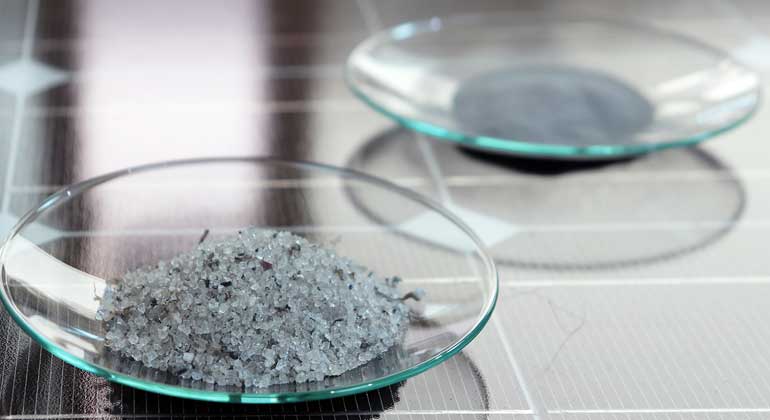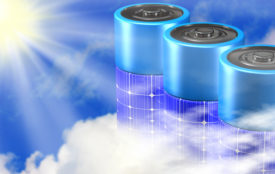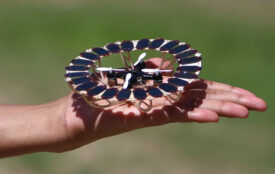Standardization for the recycling of PV modules
Solar energy plays a major role in the renewable energy mix for Germany, but also worldwide. By 2030, the International Renewable Energy Agency IRENA expects up to 2,840 gigawatts of installed capacity for solar energy. According to a study by Fraunhofer ISE, around 54 gigawatts of solar capacity will already be installed in Germany by the end of 2020 – equivalent to two million systems. Even though their lifetime is quite long and they remain in operation for up to 30 years, they will have to be disposed of at some point and, in the best case, recycled.
ReSi-Norm project aims to standardize and improve the recycling of solar cells
Already today, different, more or less efficient processes and concepts for the recycling of discarded PV modules are in use. However, in order to evaluate them, there is a lack of standardization and norming of recycling processes for PV modules, so that the full potential of recycling can be exploited. This goal has now been addressed by the project “Standardization and Norming of Recycling Processes for Silicon Solar Modules – ReSi-Norm”. Under the leadership of the Fraunhofer Research Institution for Materials Recycling and Resource Strategies IWKS and together with the three partners VDE Renewables GmbH, DKE Deutsche Kommission Elektrotechnik, Elektronik Informationstechnik in DIN und VDE as well as the company Hensel Recycling GmbH, a holistic approach for solar module recycling is being realized in the project, which covers all factors for standardization along the entire materials cycle. The development of standardization proposals is intended to support the standardization processes at national and European level.
How can PV modules be better recycled?
For a long time, the return and recycling of old PV modules was hardly regulated by law in Germany, among other things due to the long service life and the resulting still low return quantities. In the course of the energy transition, photovoltaic modules are some of the most important energy converters to solar power from the natural and virtually unlimited energy source of solar radiation. This is accompanied by the need for high-quality glass and critical resources such as semiconductor materials and precious metals. In Europe, and especially in Germany, the raw materials for the production of these materials are not sufficiently available. Therefore, there is a dependency on uncertain supply chains, prices, availability and geopolitical influencing factors. In this context, the recycling of PV modules is gaining importance not only ecologically but also economically. With the EU Directive 2012/19/EU “Waste of Electrical and Electronic Equipment” (WEEE2) coming into force in 2012 and the German Electrical and Electronic Equipment Act (ElektroG2) in 2015, regulatory pressure also increased. Since the latest amendment to the WEEE2 directive in 2018, 85% of PV modules sold must also be collected and 80% recycled.
Overall, experts estimate that up to 95% of the materials incorporated in a solar module can be recycled. With the latest amendment to the ElektroG2 in December 2020, the treatment requirements for photovoltaic modules were further specified. For example, PV modules must be treated separately by type (silicon-based and non-silicon-based) when recycled, and lead, selenium and cadmium must be removed from the recovered fractions within specific limits. This is an important first step towards minimum quality requirements and resource conservation in the recycling of PV modules. In practice, however, this does not go far enough: for example, neither the PV front glass nor the silicon semiconductor material is subjected to a recycling process across the board. This is to be evaluated and implemented in ReSi-Norm as a guideline for all future processes.
Combining the latest research results and existing industrial knowledge
Mechanical, thermal and chemical recycling processes for PV modules have been researched for more than 15 years. With modern recycling processes, it is now theoretically possible to recycle old modules in such a way that the valuable materials can be almost completely returned to a production process as secondary raw materials. However, if larger quantities are to be recycled in the next decade, these processes must be continuously improved, particularly with regard to efficiency and resource conservation. It is also necessary to establish comparability of the processes in order to be able to evaluate their efficiency.
Based on the current state of research and operational applications, the project parties of ReSi-Norm therefore want to jointly set new standards for the recycling of PV modules and consider state-of-the-art processes and research results. Special consideration will be given to existing results and findings from current national or European programs and development activities.








